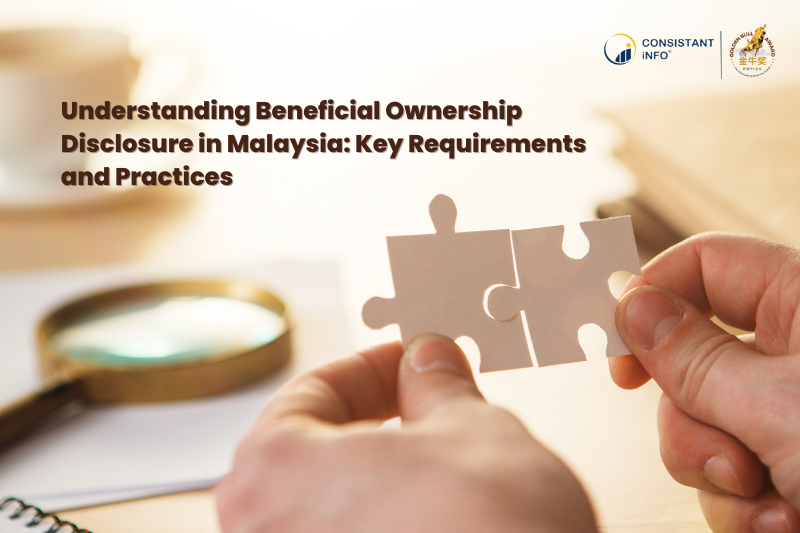
Understanding Beneficial Ownership Disclosure in Malaysia:
Key Requirements and Practices
Business entities are crucial to Malaysia’s economic growth, but their structures, such as Sdn. Bhd. or Limited Liability Partnerships, can be exploited for illicit activities like money laundering, terrorism financing, and other serious crimes. Often, the real perpetrators use these entities to hide their identities.
To combat this, the Malaysian Government has introduced new Beneficial Ownership (BO) disclosure requirements. These aim to prevent illicit activities within the corporate sector and align Malaysia’s regulations with international standards.
A) Beneficial Ownership Disclosure Requirements
- Identifying Beneficial Owners: Companies must identify the individuals who ultimately own or control them.
- Assessing Shareholder Roles: It’s essential to determine whether shareholders hold shares for themselves or act as trustees for others.
- Maintaining Accurate Records: Companies are required to keep up-to-date and accurate information about their beneficial owners.
- Granting Access to Information: Authorities must have access to beneficial ownership information, and any changes must be promptly reported to the Registrar.
B) Beneficial Ownership Criteria
To qualify as a Beneficial Owner, individuals must meet at least one of the following criteria:
- Criteria A: Directly or indirectly holding at least 20% of company shares.
- Criteria B: Directly or indirectly holding at least 20% of company voting shares.
- Criteria C: Exercising control over directors and/or management.
- Criteria D: Having the power to appoint or remove directors with majority voting rights.
- Criteria E: Collaborating with others to gain majority voting rights.
- Criteria F: Holding less than 20% of shares but exerting significant control over the company.
Even without direct or indirect share ownership, a person can be deemed a Beneficial Owner if they meet Criteria C by exercising significant influence over the company.
C) Updating and Submitting the Beneficial Ownership Register
Companies must maintain and update a database of all Beneficial Owners, submitting it to the Companies Commission of Malaysia (SSM) annually. Key practices include:
- Sending notices to Beneficial Owners at least once a year to verify details.
- Recording all communications in the Register.
- Reporting any changes in Beneficial Owner details to SSM within 14 days.
- Allowing authorities and named Beneficial Owners to access the register.
- Keeping records from the day a person becomes a BO until seven years after they cease to be one.
- Storing the register at the registered office in physical or electronic form.
Naming a senior management member as a stand-in if there is no Beneficial
D) Identifying Beneficial Owners
To ensure the accuracy of the Beneficial Owner register, companies can legally request confirmation in the following situations:
- When a person is identified as a Beneficial Owner.
- If a member knows the identity of a Beneficial Owner.
- When there is a change in Beneficial Owner details.
- If the recorded details of a Beneficial Owner are incorrect.
Keeping track of Beneficial Owners has always been part of a Company Secretary’s duties. The significant change is the requirement to regularly share this information with SSM, enhancing transparency and regulatory compliance in Malaysia’s corporate sector.
By adhering to these guidelines, companies can help maintain a transparent and lawful business environment, fostering economic stability and growth.
E) Penalties or Compound for Non-Compliance
No | Section | Offence | Penalty |
1 | Subsection 60C(7) | The company and every officer who fails to comply with subsections 60C(1), (2), (3), (4), (5) &(6) | General penalty under Section 588 |
2 | Subsection 60C(8) | Any person who contravenes any notice under section 60C | General penalty under Section 588 |
3 | Subsection 60C(9) | Any person who in purported compliance with any notice under section 60C makes any false or reckless statement | General penalty under Section 588 |
4 | Subsection 60D(4) | Any person who contravenes section 60D | General penalty under Section 588 |
In Malaysia, strict penalties are in place under Section 588 for those who fail to comply with Beneficial Ownership requirements. These penalties include:
- Individuals: Facing up to three years of imprisonment and fines reaching RM50,000.
- Non-individuals (such as companies or organizations): Incurring fines up to RM50,000.
These severe penalties aim to ensure adherence to the regulations and promote transparency within the corporate sector. The following four offenses are covered under this provision:
- Failure to Identify Beneficial Owners: Not properly identifying the individuals who ultimately own or control the company.
- Incorrect or Incomplete Information: Providing false or incomplete information about beneficial ownership.
- Non-Disclosure of Changes: Failing to report any changes in the beneficial ownership information to the Registrar in a timely manner.
- Obstruction of Access: Preventing law enforcement or regulatory authorities from accessing the beneficial ownership information.
By understanding and adhering to these requirements, companies and individuals can avoid significant legal repercussions and contribute to a transparent and compliant business environment in Malaysia.
